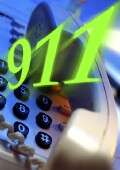During acute coronary syndromes, fewer than one-quarter of patients call 911, according to a study published in the Jan. 1 issue of The American Journal of Cardiology.
(HealthDay)—During acute coronary syndromes, fewer than one-quarter of patients call 911, according to a study published in the Jan. 1 issue of The American Journal of Cardiology.
Jonathan D. Newman, M.D., from the Columbia University Medical Center in New York City, and colleagues conducted patient interviews and structured chart reviews to determine gender differences in calling 911.
The researchers found that, of the 476 patients studied, 292 (61 percent) were diagnosed with unstable angina and 184 (39 percent) were diagnosed with myocardial infarctions (MIs). Only 23 percent of patients called 911. For women and men with unstable angina, similar percentages called 911 (15 and 13 percent, respectively). However, women with MIs were significantly more likely to call 911 than men (57 versus 28 percent). Women were 1.79 times more likely to call 911 during an MI than men (P < 0.01) after adjusting for other factors, including sociodemographic factors, health insurance status, history of MI, the left ventricular ejection fraction, Global Registry of Acute Coronary Events score, and acute coronary syndrome symptoms.
"In conclusion, the findings of the present study suggest that initiatives to increase calls to 911 are needed for women and men," the authors write.
More information:
Abstract
Full Text (subscription or payment may be required)
Journal information: American Journal of Cardiology
Copyright © 2012 HealthDay. All rights reserved.



















